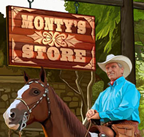This was a beautiful lesson. I am working actually with some young horses around 4 years of age. I take them regularly in the roundpen to work with them. On the pasture they started to move away when I wanted to catch them. Two have taken again confidence, one is still a bit difficult. I am thinking about why do they behave like that. Can they associate the catching with the work that will follow? Is it the separation from the other horses on the pasture? What do you think?
Rewards
Subscribe to Equus Online University and become a part of Monty's worldwide mission to leave the world a better place for horses and for people too.
Students automatically gain access to special rewards, such as exclusive discounts at the Monty Roberts Online Shop. Visit Monty Roberts Online Shop.




Hi Rudi
.
I think its because of the work that comes after catching. My rescue horse ran to me when we first got him (I guess because he associated me with food). Then when the work got more intense, he went through a stage where he was difficult to catch at times. He is pretty good now though.
.
In the Catching Your Horse in the Pasture video lessons I am pretty sure Monty Roberts mentions that some times we should catch the horses and then just let them go without work so that catching is not always an indicator of work.
.
I guess the trick is to cause the horse to WANT to work with us :-) so that catching isn't a big deal.
.
Kind regards,
.
Gen
I have still a doubt on what happens. One of the basic principals of learning is the close relation of time between the behaviour and the reaction. On the other hand a horse should be able to associate the catching with something that happens far more later? Or do they associate a chain of things, like finding the way back to the barn?
Interesting point, Rudi!
I for one is quite convinced that even if horses have trouble with the concept "we'll do that later" - much like a 2- or 3- year old child would - they can still anticipate things based on a "triggering event".
For example, some competition horses knows it's "showtime" when they get braided, or a special trailer is brought out, even if they don't get loaded within the next couple of minutes.
Maybe it is more of a habitual thing than actual associating a chain of events? If one routine follows another often enough, the horse is bound to put it together.
Dear all. I come back to the horses who do not like to be caught. After 3 weeks of a break I have restarted the training of a 4 year old gelding. After some days I was unable to catch him: he galopped away and bucked. The following days I just went on the pasture to "Join-Up" all the other horses and got closer to him everyday (rule of the game: I will go away before the you decide to leave). Today he is looking at me "May I come?", I said "Yes" and he came from a distamce of 10 meters. I still wonder what he is thinking, probably in immages as says Temple Grandin.
Rudi
Great decision on your part. I am a firm believer that horse will like to 'work' if they get something out of it. For example just the rub rewards they get or learning something new that they are rewarded for.
Horses like to learn new things so I try to make each work session slightly different than the last. If a horse is having a problem understanding what is being asked I will either stop the lesson and just walk the horse around for 10 or 15 minutes then try the lesson again. If that does not work then I figure he is either not ready to learn what I am asking or I am not asking so he understands. That is always the dilemma when training. Rudi you were able to solve the dilemma but just doing nothing and letting time be the trainer. Sometimes that is really hard since you want to be successful in every lesson.
Cheers